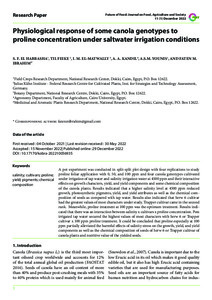| dc.date.accessioned | 2023-03-24T14:33:44Z | |
| dc.date.available | 2023-03-24T14:33:44Z | |
| dc.date.issued | 2022-12-29 | |
| dc.identifier | doi:10.17170/kobra-202210056935 | |
| dc.identifier.uri | http://hdl.handle.net/123456789/14526 | |
| dc.language.iso | eng | |
| dc.rights | Namensnennung 4.0 International | * |
| dc.rights.uri | http://creativecommons.org/licenses/by/4.0/ | * |
| dc.subject | salinity | eng |
| dc.subject | cultivars | eng |
| dc.subject | proline | eng |
| dc.subject | yield | eng |
| dc.subject | pigments | eng |
| dc.subject | chemical composition | eng |
| dc.subject.ddc | 580 | |
| dc.subject.ddc | 630 | |
| dc.title | Physiological response of some canola genotypes to proline concentration under saltwater irrigation conditions | eng |
| dc.type | Aufsatz | |
| dcterms.abstract | A pot experiment was conducted in split-split plot design with four replications to study proline foliar application with 0, 50, and 100 ppm and four canola genotypes cultivated under irrigation of tap water and salinity irrigation water at 4500 ppm and their interactive effects on growth characters, yield, and yield components and some chemical composition of the canola plants. Results indicated that a higher salinity level at 4500 ppm reduced growth, photosynthetic pigments, yield, and yield attributes as well as the chemical composition of seeds as compared with tap water. Results also indicated that Serw 6 cultivar had the greatest values of most characters under study. Trapper cultivar came in the second rank. Meanwhile, proline treatment at 100 ppm was the optimum treatment. Results indicated that there was an interaction between salinity x cultivars x proline concentration. Pots irrigated tap water secured the highest values of most characters with Serw 6 or Trapper cultivar x 100 ppm proline treatment. It could be concluded that proline especially at 100 ppm partially alleviated the harmful effects of salinity stress on the growth, yield, and yield components as well as the chemical composition of seeds of Serw 6 or Trapper cultivar of canola plants and nutritive value of the yielded seeds. | eng |
| dcterms.accessRights | open access | |
| dcterms.creator | El Habbasha, Sayed Fathi | |
| dcterms.creator | Feike, Til | |
| dcterms.creator | EL-Matwally, I. M. | |
| dcterms.creator | Kandil, Abdalrham A. | |
| dcterms.creator | Younis, Abd El-Samad Mahmoud | |
| dcterms.creator | Ibrahim Ali, Faten Mohamed | |
| dc.subject.swd | Prolin | ger |
| dc.subject.swd | Genotyp | ger |
| dc.subject.swd | Raps | ger |
| dc.subject.swd | Bewässerung | ger |
| dc.subject.swd | Salzwasseraufbereitung | ger |
| dc.subject.swd | Salzgehalt | ger |
| dc.type.version | publishedVersion | |
| dcterms.source.identifier | eissn:2197-411X | |
| dcterms.source.issue | No. 1 | |
| dcterms.source.journal | Future of Food: Journal on Food, Agriculture & Society | eng |
| dcterms.source.volume | Vol. 11 | |
| kup.iskup | false | |
| dcterms.source.articlenumber | 538 | |


